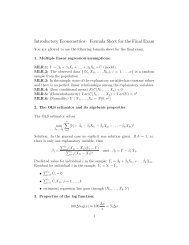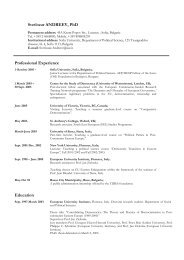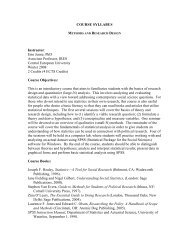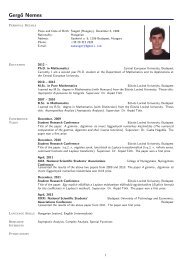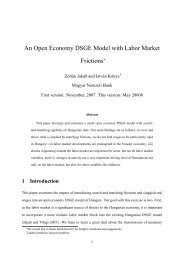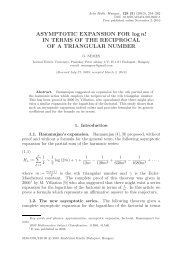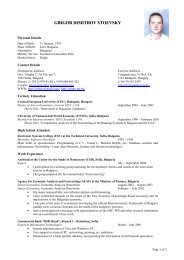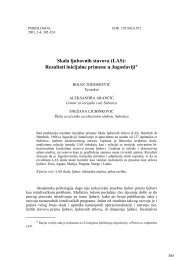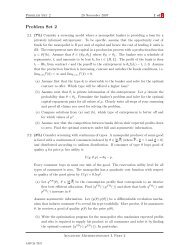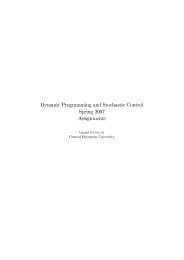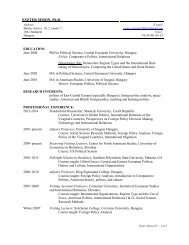Testing Gateway Theory: do cigarette prices affect illicit drug use?
Testing Gateway Theory: do cigarette prices affect illicit drug use?
Testing Gateway Theory: do cigarette prices affect illicit drug use?
You also want an ePaper? Increase the reach of your titles
YUMPU automatically turns print PDFs into web optimized ePapers that Google loves.
680 M. Beenstock, G. Rahav / Journal of Health Economics 21 (2002) 679–698<br />
<strong>Gateway</strong> <strong>Theory</strong> was originally developed in the 1970s by Kandel (1975). She observed<br />
that there is a systematic sequencing in the <strong>use</strong> of psychoactive substances which runs from<br />
alcohol and <strong>cigarette</strong>s, then to cannabis, and finally to “hard” <strong>drug</strong>s such as cocaine, heroin<br />
and LSD. Cigarettes are a “gateway” to cannabis, which in turn is a “gateway” to hard <strong>drug</strong>s.<br />
Of course not all <strong>cigarette</strong> smokers go on to <strong>use</strong> cannabis, and it should be noted that not<br />
all cannabis consumers first smoked <strong>cigarette</strong>s. Nevertheless, <strong>cigarette</strong> smokers are more<br />
likely to <strong>use</strong> cannabis subsequently than non-smokers. A similar juxtaposition applies to<br />
cannabis and hard <strong>drug</strong>s; cannabis <strong>use</strong>rs are more likely to <strong>use</strong> hard <strong>drug</strong>s eventually than<br />
non-<strong>use</strong>rs of cannabis, but not all hard <strong>drug</strong> consumers <strong>use</strong>d cannabis first.<br />
The scientific literature on <strong>Gateway</strong> <strong>Theory</strong> is too vast to be reviewed here. However,<br />
it splits into two broad camps. One camp (e.g. O’Donnell and Clayton, 1982) regards the<br />
gateway effect to be causal or generative. According to this view <strong>cigarette</strong> smoking induces<br />
cannabis <strong>use</strong>, and cannabis <strong>use</strong> induces hard <strong>drug</strong> consumption. This implies that if smoking<br />
were restricted there would be less <strong>use</strong> of cannabis. It also implies that if cannabis were<br />
legalized there would be more <strong>use</strong> of hard <strong>drug</strong>s. It is obvious how this causal interpretation<br />
of <strong>Gateway</strong> <strong>Theory</strong> has been grist to the mill of the anti liberalization lobby. The rival camp<br />
(e.g. Baumrind, 1983) views the gateway effect to be merely predictive or even descriptive.<br />
Economists will recognize this as Granger causality; due to systematic sequencing <strong>cigarette</strong><br />
consumption may help predict cannabis consumption, and cannabis consumption may help<br />
predict hard <strong>drug</strong> consumption. However, Granger causality <strong>do</strong>es not imply causality itself<br />
and has no implications for policy.<br />
The longstanding debate about <strong>Gateway</strong> <strong>Theory</strong> revolves around the identification problem.<br />
Does the fact that <strong>cigarette</strong> smokers are more likely to go onto <strong>use</strong> cannabis result<br />
from unobserved heterogeneity, i.e. people with a greater susceptibility to smoke <strong>cigarette</strong>s<br />
also have a greater susceptibility to consume cannabis, or <strong>do</strong>es it result from a treatment<br />
effect, i.e. exposure to <strong>cigarette</strong>s (the treatment) induces cannabis <strong>use</strong> (the outcome)? The<br />
vast number of empirical papers on <strong>Gateway</strong> <strong>Theory</strong> have not resolved the identification<br />
problem.<br />
One way to resolve this identification problem is to apply the metho<strong>do</strong>logy of natural<br />
experimentation, which in the present context seeks to ran<strong>do</strong>mize <strong>cigarette</strong> smoking so that<br />
its causal effect on subsequent <strong>use</strong> of cannabis is identified. We <strong>use</strong> the data for Israel to<br />
apply the metho<strong>do</strong>logy, and follow Evans and Ringel (1999) who study the effect of smoking<br />
on birth weights by using <strong>cigarette</strong> price data to ran<strong>do</strong>mize smoking behavior. They <strong>use</strong><br />
cross section data and ran<strong>do</strong>mize <strong>cigarette</strong> smoking by exploiting differential tax rates on<br />
<strong>cigarette</strong>s in the US. Pacula (1998) too <strong>use</strong>s cross section data to identify the gateway effect<br />
of alcohol by exploiting differential tax rates on alcohol in the US.<br />
Natural experiments in econometrics usually exploit cross section differences in instrumental<br />
variables. A metho<strong>do</strong>logical innovation in our approach to natural experimentation<br />
consists of exploiting time series data rather than cross section data. We <strong>do</strong> so beca<strong>use</strong><br />
there are no cross sectional or geographical differences in <strong>cigarette</strong> <strong>prices</strong> (or other potential<br />
instruments) in Israel. However, there has been extensive variation in the real price of<br />
<strong>cigarette</strong>s over time. People who grew up when <strong>cigarette</strong>s were cheap are more likely to<br />
smoke than people who grew up when they were expensive. Beca<strong>use</strong> individuals <strong>do</strong> not<br />
chose their year of birth or the price of <strong>cigarette</strong>s and other variables we have the basis of<br />
a natural experiment.



